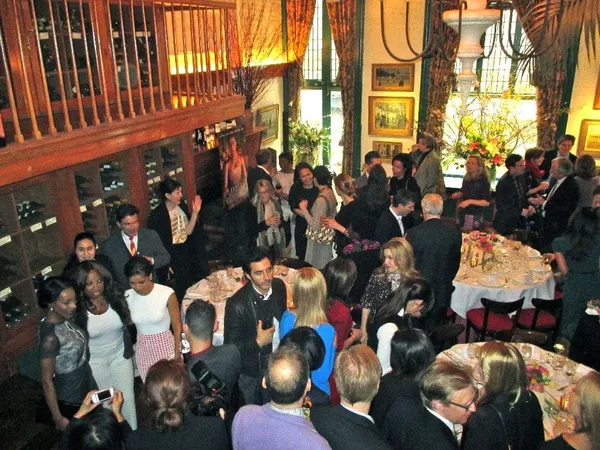 |
| Belle luncheon at La Grenouille hosted by the British Ambassador to the United Nations Mark Lyall Grant with Stefano Tonchi, Editor in Chief of W Magazine Photo: Anne-Katrin Titze |
Fox Searchlight Pictures’ Belle was celebrated with a luncheon hosted by the British Ambassador to the United Nations, Mark Lyall Grant, with Stefano Tonchi, Editor in Chief of W Magazine, Dr. Amanda Foreman, Tamron Hall, Faye Wattleton and Alek Wek, at La Grenouille in New York. Amma Asante's Belle stars Gugu Mbatha-Raw, Sarah Gadon, Tom Wilkinson, Penelope Wilton, Matthew Goode, Miranda Richardson, Sam Reid, James Norton, and Emily Watson. Among those attending the lunch following the screening were designers Olivier Theyskens and Yigal Azrouel.
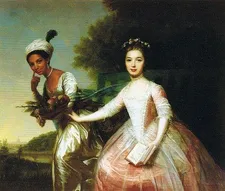 |
| The portrait. |
Belle is the story of a portrait, a ship at sea, a court case and how the abolition of slavery in Britain could have come about. Dido Belle, played by Gugu Mbatha-Raw grows up with her cousin Elizabeth (Sarah Gadon) at their uncle Chief Justice Lord Mansfield's (Tom Wilkinson) estate. He is about to decide on the famous Zong case. Amma Asante unfolds a tapestry that challenges preconceived notions of race and gender, money and character. Paternal love may just about determine the highest thread count.
Anne-Katrin Titze: You show the interactions between the two cousin sisters, Dido and Elizabeth, in a very nuanced way. Tell me about how you saw them.
Amma Asante: It was very important to me for Dido to sit within a context. The movie is very much about a romantic love story, a paternal love story, but it's also about a sister-ship. These girls are cousins but they grow up as sisters. It is based on a historic story, as you know. There's been many versions, people have shot short films based on Dido's story, and they portray these two girls as not liking each other, as being very dissatisfied with each other. When I looked at the painting, I immediately saw love. The way Elizabeth's hand is resting on Dido, the confidence, the happiness that Dido has, I just saw love and happiness.
AKT: So the painting was the starting point for your approach to their relationship?
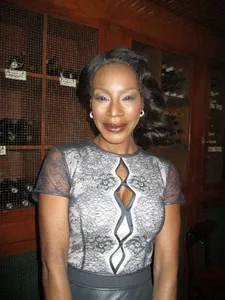 |
| Amma Asante, director of Belle on Dido and Elizabeth: "I wanted to create a real sisterhood." Photo: Anne-Katrin Titze |
AA: Absolutely my starting point. I wanted to create a real sisterhood. There are instances when sisters really protect each other and nobody can say anything about either sister. They can be very honest with each other. I wanted it to be real and get to the point where we have an argument between the two sisters.
AKT: One of the most powerful scenes in your film, I felt.
AA: Yeah. What is going to come out of Elizabeth's mouth? She doesn't dare. She doesn't go there. I wouldn't let her. Because we could never come back from that. That's the case. Sisters argue, but don't you ever dare attack my sister because I'm her biggest protector. It was really important for me to have a sister-ship on screen, to have two women loving each other.
AKT: Is there a particular scene that is dearest to your heart?
AA: There are so many. There's the scene where Lord and Lady Mansfield talk about Dido. They talk about their love for her and Lady Mansfield (Emily Watson) is reminding Lord Mansfield (Wilkinson) of who he is and why he has to do the right thing by his child. I so wanted to show a black child on screen being loved. It was this period and it's unusual but I wanted to show her being loved. It's seen both ways - the scene where her biological father leaves her and tells her that he loved her mother is incredibly important to me. But also the scenes between Dido and Lord Mansfield where it's so clear he loves her. Her role in this movie is to teach them not to love her but how to love her - the right way to love her.
AKT: Tom Wilkinson is great. He makes the most interesting choices in the roles he portrays. He has become one of the most conscientious and daring actors.
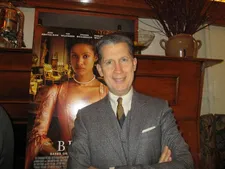 |
| Stefano Tonchi, Editor in Chief of W Magazine: "It's not only about love. It's about moving on." Photo: Anne-Katrin Titze |
AA: He is my second dad! His choice of movies is incredible. To become a supporting actor to a young actress whose star is still rising is so open. It's such a magnanimous gift. He does it because he is a real artist and because he wanted to tell this story. I'm so proud of him, so proud of his performance and grateful.
I arrived at the Belle preview before the luncheon at the same time as Theory designer Olivier Theyskens, both of us entering the Dolby Screening Room a few minutes late. We caught up at La Grenouille.
Olivier Theyskens: I never see movies in the morning!
Anne-Katrin Titze: Did you have a favorite scene?
OT: I think the scene when the judge (Wilkinson) reveals his thinking. The final scene, I think. This actor is amazing. Tom Wilkinson is an incredible actor.
AKT: He is fantastic and captures that crucial moment in history [the process leading to the abolition of slavery in Britain].
OT: Yes, that it is all inspired by real fact. I thought how interesting it was that moment when people had to debate about this crucial thing about humanity. This is such a moment, a pivotal moment.
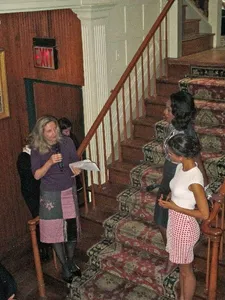 |
| Dr. Amanda Foreman with Amma Asante and Gugu Mbatha-Raw: "She comes of age as one of the most important legal cases takes place in Great Britain." Photo: Anne-Katrin Titze |
AKT: A good thing to see wide awake in the morning.
OT: Yeah. Interesting painting, by the way. Did you know it really existed?
AKT: I didn't know about it.
OT: Me neither. Because we arrived after, during the whole thing we were wondering about what was revealed earlier.
Stefano Tonchi joined our conversation and spoke about his perspective on the film.
Stefano Tonchi: It's not only about love. It's about moving on. Making choices that are not obvious. That's why I think Dido in the painting is standing up while her sister is sitting.
AKT: Dido is in movement with the flowers.
ST: Movement, exactly. I thought that was very typical. It's great when you have the dialogue between the two [sisters]. That was one of the most intense moments.
AKT: I agree. The relationship is not simplistic at all.
ST: Because they are sisters and they are like friends. And they realise that actually they are in different social categories that have nothing to do with the colour of their skin.
AKT: It all comes down to money.
ST: Yes, money. And money really is an excuse of how they've been treated by their fathers. Because one is legitimate and the other illegitimate. There are many layers.
After the lunch, historian Dr. Amanda Foreman gave some background and Gugu Mbatha-Raw spoke on getting into her role as Dido in Belle.
Dr. Amanda Foreman: The heroine of the film, Dido, is based on a true story. It's about a young woman of mixed race who was brought up in a very grand home, the home of Lord Mansfield. She comes of age as one of the most important legal cases takes place in Great Britain. A slave trade case. It's her guardian and uncle who decides the case and her input is of paramount importance. That is the film in a nutshell. It is based on the famous Zong [slave ship] case. Lord Mansfield, the chief justice at the time, decided the two most important cases in legal history in England at the time. The first was the Somersett case which essentially in 1772 decreed that slavery could not be upheld on British soil.
![Theory designer Olivier Theyskens: "This actor is amazing. Tom Wilkinson [Lord Mansfield] is an incredible actor."](/images/newsite/Theory_designer_Olivier_Theyskens_225.webp) |
| Theory designer Olivier Theyskens: "This actor is amazing. Tom Wilkinson [Lord Mansfield] is an incredible actor." |
The second case was the Zong case, that in essence maintains that human beings could not be classed as cargo… Lord Mansfield thought there were about 40 thousand African Britons in England at the time. They were very much integrated into British society - they were sailors, they were wig makers, they were hair dressers. In fact, the greatest hair dresser in 18th century England and especially in London was a black Briton called Gilbert. He was the Duchess of Devonshire's hairdresser. He made all the great wigs and styles with feathers. They were also innkeepers.
The first black man voted in the 1777 elections. This is a very interesting and complex time… Women in the 18th century were not really free to make personal choices. However, they did have agency. The first female led boycott coming down in the 1780s is a anti-sugar boycott and it's to end slavery. And Belle typifies that. She doesn't have the right to vote but she does have the right to have emotional agency and to persuade and have an impact.
Gugu Mbatha-Raw: I didn't know much about Dido beforehand. It was really grounding and exciting for me. Very inspiring. It was a gift to have a role like this. There was a sense of restrained emotion and the etiquette of the day. There's the proper clothes and the corsets and the rituals and just the way society functioned. I loved having that restraint, because the moment when you do get to explode and put the men in their place, or lose your temper, whatever it is - it has that much more significance.
Belle opens in the US on May 2 and in the UK on June 13.





















